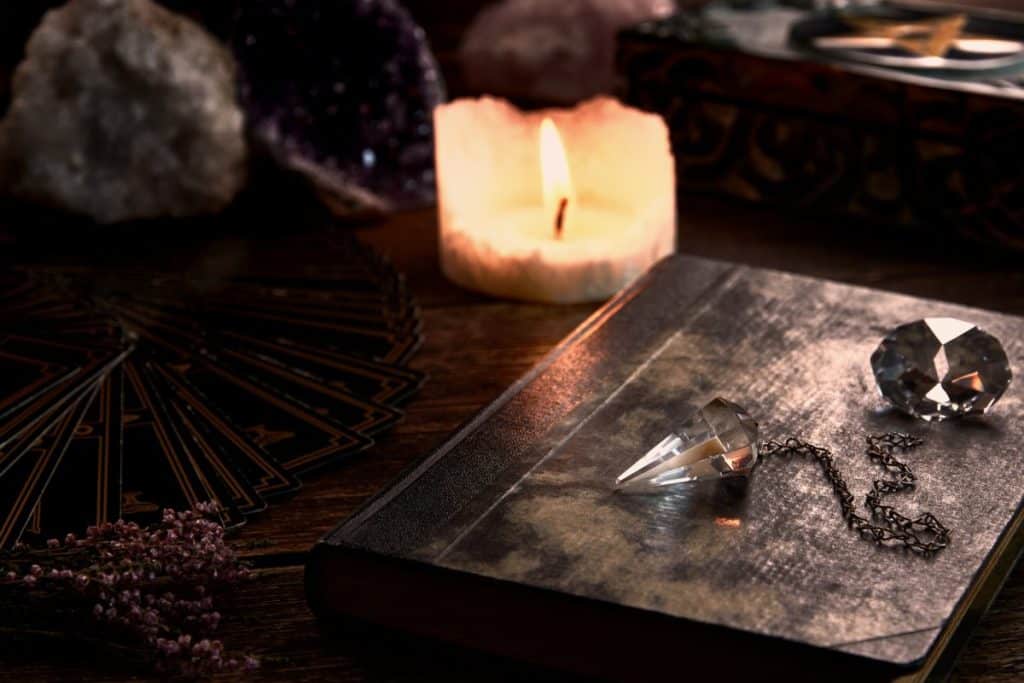Discovering the Types of Witchcraft: Wicca, Traditional Witchcraft, and Eclectic Witchcraft
Witchcraft is a practice that has been around for centuries, and its popularity has been steadily growing in recent years. In fact, according to a survey conducted by Pew Research Center, there has been an increase in the number of people who identify as witches in the United States over the past few decades.
With the rise in the popularity of witchcraft, there has also been an increase in the number of different types of witchcraft.

Each type of witchcraft has its own unique beliefs and practices, which can be overwhelming for beginners who are just starting out.
Table of Contents
What is Witchcraft?
Witchcraft is a practice that involves connecting with the spiritual world to manifest change in the physical world. It is often associated with magic, spells, and rituals but can also involve meditation, divination, and other spiritual practices.
Witchcraft has been practiced all over the world throughout history, and it is deeply intertwined with cultural and religious beliefs.
In some societies, witchcraft has been seen as a positive force for healing and spirituality; in others, it has been associated with fear and persecution.
Today, witchcraft is often seen as a way to connect with nature, tap into one’s intuition, and find a sense of empowerment. It is not a religion, although it can be a part of one’s spiritual or religious practice.
Wicca
Origins and History of Wicca
Wicca is perhaps the most well-known form of witchcraft. It was founded in the 1950s by Gerald Gardner, who drew inspiration from various sources such as ceremonial magic, European folk traditions, and Masonic symbolism.
Gardner believed that witchcraft was a pre-Christian pagan religion that the church had suppressed. He sought to revive this religion and bring it back into the mainstream by creating a new form of witchcraft that he called Wicca.
Core Beliefs and Values
At its core, Wicca is a nature-based religion that honors the goddess and god as embodiments of the divine. Wiccans believe in the interconnectedness of all things and strive to live in harmony with nature.
Wiccans also strongly emphasize ethics and morality, with the Wiccan Rede “An it harm none, do what ye will” as a guiding principle. This means that Wiccans are encouraged to live their lives in a way that does not harm others or the environment.
Practices
Some common Wiccan practices include celebrating the eight Sabbats, or seasonal festivals, casting circles for rituals and spells, and using tools such as wands, athames, and chalices. Wiccans also practice a form of magic that is focused on manifesting positive change and healing.
Wiccans may also work with various deities, although the specific deities they work with can vary depending on the individual. Some Wiccans may work exclusively with the goddess and god, while others may incorporate deities from other pantheons or cultures.
Traditional Witchcraft
Definition and History
Traditional witchcraft, also known as “the old craft,” is a type of witchcraft that has its roots in pre-Christian Europe. It is focused on ancestral traditions and folk magic, which often involves working with herbs, stones, and other natural elements.
Unlike Wicca, traditional witchcraft is not a religion and does not have a set of organized beliefs. Practitioners often draw from their cultural and familial backgrounds to create their own unique practice. Traditional witches may work with deities, ancestors, or spirits but do not follow a specific pantheon or religious structure.
Practices
Some common traditional witchcraft practices include divination, spell-crafting, and working with spirits and the dead. Traditional witches may also incorporate aspects of folklore and mythology into their practice.
In traditional witchcraft, the practitioner is often seen as a mediator between the spiritual and physical world. They may use divination tools such as tarot cards or scrying mirrors to communicate with the spirit world and gain insight into their lives.
Traditional witches may also use spells and rituals to manifest change in their lives or the lives of others. These spells often involve working with natural elements such as herbs, stones, and candles.
Eclectic Witchcraft
Definition and Characteristics
Eclectic witchcraft is a type of witchcraft that draws from multiple traditions and practices. Eclectic witches often create their own unique practice by taking what resonates with them from different sources and combining them into a personalized path.
Unlike Wicca and traditional witchcraft, eclectic witchcraft has no set structure or guidelines. Practitioners are encouraged to experiment, explore, and create their own practice based on their individual beliefs and experiences.
Practices
Some common eclectic witchcraft practices include creating vision boards, working with crystals and tarot cards, and incorporating elements of shamanism or other spiritual practices.
Eclectic witches may also incorporate aspects of other religions or belief systems into their practice, such as Buddhism or Hinduism. Eclectic witchcraft focuses on personalization and individuality rather than adherence to a specific set of beliefs or practices.
Conclusion
In summary, witchcraft is a practice that has been around for centuries and has taken many different forms throughout history. Today, there are many different types of witchcraft, each with its own unique beliefs and practices.
Wicca is a nature-based religion focused on the worship of a goddess and god, traditional witchcraft is rooted in pre-Christian European traditions and folk magic, and eclectic witchcraft is a personalized practice that draws from various traditions.
As you explore different types of witchcraft, remember there is no “right” or “wrong” way to practice. Each type of witchcraft offers its own benefits and opportunities for personal growth and connection to the spiritual world.
If you’re interested in learning more about witchcraft, there are many resources available online and in books. Some recommended resources include “Wicca: A Guide for the Solitary Practitioner” by Scott Cunningham, “The Witch’s Book of Shadows” by Phyllis Curott, and “Liber AL vel Legis” by Aleister Crowley.
Lastly, it’s important to respect and honor the beliefs and practices of others, even if they differ from yours. Witchcraft is a deeply personal practice, and everyone’s spiritual journey is unique.
We can create a more supportive and inclusive community by approaching each other with kindness and understanding.






